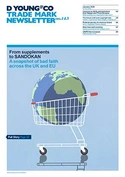Vape wars: interim injunctions, unjustified threats and the battle for the “Crystal Bar”
This recent High Court decision concerning an application for an interim injunction by the defendant to restrain the claimant from making further unjustified threats of trade mark infringement proceedings against the defendant’s distributors highlights the importance of statutory unjustified threats provisions. The defendant based its application on the provisions in sections 21 to 21F of the Trade Marks Act 1994, which restrict the making of unjustified threats of trade mark infringement.
Background
The case concerns a dispute between Bargain Busting Ltd and various Shenzhen SKE Technology Co Ltd entities (collectively SKE) regarding alleged trade mark infringement in the vaping products sector. Bargain Busting is a non-specialised wholesaler. SKE is a manufacturer of e-cigarettes and vaping devices and has achieved success marketing these devices under the name “CRYSTAL BAR” and other signs using the word “CRYSTAL”. Bargain Busting owns two registered trade marks containing the word “CRYSTAL” and an application for the mark “CRYSTAL BAR”, which was opposed by SKE.
There are various ongoing proceedings between Bargain Busting and SKE in the High Court of England and Wales and the UK Intellectual Property Office (UKIPO). All of the claims relate to rights associated with vapes sold under the sign (or signs) containing “CRYSTAL”.
The High Court trade mark infringement proceedings were issued by Bargain Busting against SKE in September 2024. Two months later, in December 2024, Bargain Busting sent letters to eleven distributors and retailers of SKE’s products, threatening trade mark infringement proceedings if they did not stop selling the allegedly infringing products. Bargain Busting subsequently joined four of these parties into the existing High Court proceedings against SKE.
The High Court’s approach
The following approach was taken by the High Court in respect of SKE’s interim injunction application:
- The starting point for interim injunctions is American Cyanamid v Ethicon [1975].
- The injunction sought would (to a very limited extent) affect Bargain Busting’s freedom of expression rights under Article 10 of Schedule 1 to the Human Rights Act 1998 and Section 12 of the Human Rights Act is therefore engaged. Accordingly, before granting an injunction, the court must be satisfied that the applicant is likely to establish that publication should not be allowed.
- The court must also consider the guidance in Cream Holdings v Banerjee [2004] that an applicant would generally have to show that it would “more likely than not” succeed at trial. However, the guidance acknowledged there would be cases where it would be necessary to depart from this general approach. On this basis, the judge applied a flexible approach to Section 12 of the Human Rights Act and found that that SKE had satisfied the requirement to show that there was a serious issue to be tried which might well succeed at trial.
- It was concluded that damages would not adequately compensate SKE due to the difficulty in establishing a link between threats and losses, particularly given that SKE’s UK sales were over $400 million in 2024.
- SKE’s offer to pay £100,000 into court as a cross-undertaking in damages was deemed sufficient.
Conclusion
An interim injunction was granted and Bargain Busting was ordered not to make further threats against SKE’s distributors pending trial.
It was decided that the impact of an injunction on Bargain Busting’s Article 10 rights would be limited and proportionate, representing an appropriate balance with SKE’s competing rights. It was emphasised that the injunction should be narrowly tailored to apply only to customers in respect of goods supplied by SKE and should reflect the qualifications and exceptions provided for in the Trade Marks Act.
This decision underscores the High Court’s willingness to intervene where threats of legal proceedings may be unjustified and cause commercial harm.
In short
This case emphasises the significance of statutory unjustified threats provisions (contained in Section 21 of the Trade Marks Act 1994) in protecting businesses from commercial harm caused by potentially groundless legal threats and clarifies the High Court’s approach to balancing IP enforcement with the prevention of commercial harm.
Case details at a glance
Jurisdiction: England & Wales
Decision level: High Court
Parties: Bargain Busting Ltd v Shenzhen SKE Technology Co Ltd & Others
Date: 21 May 2025
Citation: [2025] EWHC 1239 (Ch)
Decision: dycip.com/2025-ewhc-1239ch

